
International Journal of Education in Mathematics Science and Technology
Scope & Guideline
Fostering dialogue and collaboration for a brighter educational future.
Introduction
Aims and Scopes
- STEM Education:
Focuses on the integration of Science, Technology, Engineering, and Mathematics (STEM) education, promoting interdisciplinary approaches to enhance student engagement and learning outcomes. - Technology Integration in Education:
Explores innovative uses of technology in educational settings, including digital tools, online learning, and gamification to improve teaching and learning. - Teacher Professional Development:
Investigates effective strategies for teacher training and professional development, particularly in enhancing pedagogical skills and technological competencies. - Student-Centered Learning:
Examines approaches that prioritize student engagement and active learning, such as inquiry-based learning, problem-based learning, and reflective practices. - Research in Mathematics Education:
Contributes to the body of research on mathematics education practices, including assessments of teaching methodologies, curriculum development, and educational policies. - Cross-Curricular Connections:
Promotes the integration of mathematics and science with other disciplines to foster a holistic understanding of concepts and real-world applications.
Trending and Emerging
- Artificial Intelligence in Education:
Recent publications explore the role of artificial intelligence in educational settings, addressing both its potential benefits and challenges in teaching and learning. - Online and Blended Learning:
With the rise of digital education, there is an increasing focus on online and blended learning strategies, especially in light of the adaptations required during the COVID-19 pandemic. - Development of Soft Skills:
There is a growing emphasis on nurturing soft skills, such as communication, collaboration, and critical thinking, within STEM education, recognizing their importance in students' overall development. - Interdisciplinary Approaches:
Emerging themes highlight the importance of interdisciplinary education, integrating STEM with arts and humanities to foster creativity and innovative thinking. - Culturally Responsive Teaching:
Research focusing on culturally responsive pedagogy and its impact on student engagement and achievement is gaining traction, addressing diversity and inclusion in STEM education.
Declining or Waning
- Traditional Teaching Methods:
There has been a noticeable decrease in publications centered around traditional, lecture-based teaching methodologies, as the focus shifts toward more interactive and student-centered approaches. - General Educational Theories:
Research that broadly discusses general educational theories without specific application to STEM or technology integration has become less frequent, indicating a move towards more specialized and practical applications. - Focus on Non-STEM Disciplines:
The journal has seen a decrease in articles focused on non-STEM disciplines, reflecting a more concentrated effort on enhancing STEM education specifically. - Standardized Testing Practices:
There is a decline in research addressing standardized testing practices in education, suggesting a shift towards more holistic and formative assessment methods.
Similar Journals
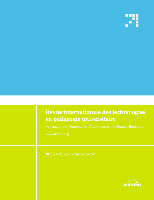
International Journal of Technologies in Higher Education
Bridging Technology and Pedagogy for Enhanced EducationInternational Journal of Technologies in Higher Education, with ISSN 1708-7570 and E-ISSN 1708-7570, is a distinguished academic platform dedicated to advancing the intersection of technology and pedagogy in higher education. Published by INT JOURNAL TECHNOLOGIES HIGHER EDUCATION, this open-access journal has been at the forefront of educational innovation since 2004, providing researchers, practitioners, and students access to high-quality research without financial barriers. The journal aims to disseminate cutting-edge studies, best practices, and theoretical insights that explore the transformative impact of emerging technologies in the field of education. Situated in Montreal, Canada, the journal serves as a pivotal resource for those committed to enhancing learning environments through technological advancements. By fostering scholarly discussion and collaboration, the International Journal of Technologies in Higher Education plays an essential role in shaping the future of educational practices globally.

Pegem Egitim ve Ogretim Dergisi
Advancing Educational Insights for Tomorrow's LeadersPegem Egitim ve Ogretim Dergisi is a prominent academic journal published by PEGEM AKAD YAYINCILIK EGITIM DANISMANLIK HIZMETLERI TIC LTD STI, specializing in the field of education. Based in Turkey, this journal offers a platform for scholarly discourse, catering to both emerging and established researchers in the educational domain. With its ISSN 2148-239X, the journal aims to provide insights into contemporary educational practices, pedagogical innovations, and research findings that influence teaching and learning. Although classified in the Q4 quartile of the education category as of 2022 and achieving a Scopus rank of 1178 out of 1469, it remains a valuable resource for practitioners and academics alike. The journal ceased Scopus coverage in 2023, yet it continues to be a relevant outlet for educational research in Turkey and beyond. While it operates under traditional access models, the potential for collaborative research and knowledge sharing makes it a noteworthy choice for those engaged in the evolving landscape of education.

International Journal for Technology in Mathematics Education
Enhancing teaching methodologies for a digital age.International Journal for Technology in Mathematics Education (ISSN: 1744-2710, E-ISSN: 2045-2519) is a pioneering platform published by Research Information Ltd that focuses on the interplay between technology and mathematics education. Established to bridge the gap between pedagogical practices and technological advancements, this journal connects researchers, educators, and practitioners in a bid to enhance teaching methodologies and optimize learning outcomes in mathematics. Although its coverage in Scopus was discontinued after 2020, it continues to be a vital resource for those interested in the integration of technology into educational settings. With its significant emphasis on interdisciplinary approaches, the journal has garnered attention in the realms of social sciences and computer science, with Scopus rankings reflecting its niche contributions. This journal is crucial for professionals aiming to explore innovative techniques in mathematics education, making it an invaluable addition to any academic library.
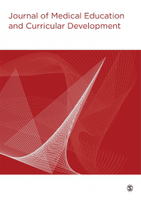
Journal of Medical Education and Curricular Development
Catalyzing Change in Medical Education and AssessmentJournal of Medical Education and Curricular Development is a pioneering open-access journal published by SAGE Publications Ltd, dedicated to advancing the field of medical education. With an ISSN of 2382-1205, this journal has been committed to providing high-quality, peer-reviewed research since 2014. It serves as a vital platform for educators, researchers, and practitioners interested in innovative teaching methodologies, curriculum development, and assessment strategies in medical education. The journal not only aims to disseminate impactful research but also encourages scholarly dialogue on best practices and emerging trends in the field. By offering unrestricted access to published articles, it ensures that knowledge is widely accessible, promoting collaboration and improvement in medical training worldwide. As a key resource for professionals and academics alike, it supports the ongoing evolution of educational practices that directly influence healthcare outcomes.
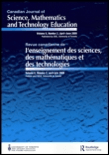
Canadian Journal of Science Mathematics and Technology Education
Advancing STEM Education Through Innovative ResearchCanadian Journal of Science Mathematics and Technology Education (ISSN: 1492-6156; E-ISSN: 1942-4051) is a prominent publication by SPRINGER based in Switzerland, dedicated to exploring innovative methodologies and practices in the fields of science, mathematics, and technology education. Established in 2001 and continuing to 2024, the journal maintains a strong reputation within the academic community, reflected in its Q2 ranking in the Education category for 2023 and a commendable Scopus ranking that places it in the top 25% of journals within the social sciences education domain (Rank #383/1543). This journal serves as a critical platform for researchers, educators, and practitioners interested in the latest developments, research findings, and discussions pertaining to instructional strategies and curricular advancements. Although it is not open access, the journal's insights and contributions are invaluable for those aiming to elevate educational practices and address contemporary challenges in STEM education.
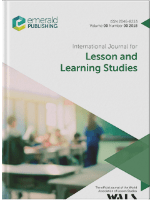
International Journal for Lesson and Learning Studies
Transforming education with cutting-edge research and practices.International Journal for Lesson and Learning Studies, published by Emerald Group Publishing Ltd, stands as a pivotal forum for researchers, educators, and practitioners in the field of education. With an ISSN of 2046-8253 and an E-ISSN of 2016-8261, this journal emerged as a valuable resource for academic discourse from 2012, continuously evolving until 2024. Classified in the Q3 category for 2023 within the education sector, it has established itself with a commendable Scopus rank of #516 out of 1543, positioning it in the 66th percentile among its peers. The journal's commitment to enhancing understanding and innovation in lesson study and learning processes is complemented by its strategic focus on scholarly contributions that bridge theory and practice, while fostering collaborative research efforts. Although it doesn't offer open access, the journal remains accessible to a diverse international audience, promoting significant insights into effective teaching methodologies and educational advancements.
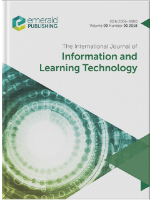
International Journal of Information and Learning Technology
Unveiling New Horizons in Information and Learning TechnologyInternational Journal of Information and Learning Technology is a pivotal publication in the fields of computer science and education, published by the esteemed Emerald Group Publishing Ltd. With an ISSN of 2056-4880, this journal has positioned itself as a valuable resource, reflecting a commitment to high-quality research and discourse in information technology and learning methodologies. Recognized for its significant contributions, it holds a respectable Q2 ranking in both Computer Networks and Communications and Computer Science Applications, along with a prestigious Q1 ranking in Education for the year 2023. The journal spans an expansive converged period from 2015 to 2024, providing an extensive archive of innovative ideas and findings that are instrumental to researchers, educators, and IT professionals alike. Although currently not open access, the publication remains vital to the academic community, ensuring that cutting-edge research and discussions continue to inform and inspire advancements in the integration of technology within learning environments. From its base in Leeds, United Kingdom, the journal invites submissions that explore the nexus of technology and education, fostering a deeper understanding of how digital innovations can enhance teaching and learning experiences.

Journal of Science Education and Technology
Bridging Science and Technology for Enhanced Learning.The Journal of Science Education and Technology, published by SPRINGER, stands as a premier platform in the fields of education and engineering, recognized with a prestigious Q1 ranking in both categories as of 2023. With an ISSN of 1059-0145 and an E-ISSN of 1573-1839, this journal serves as a pivotal resource for researchers, educators, and practitioners alike, emphasizing the integration of scientific inquiry and technological advancements in educational contexts. Since its inception in 1992, the journal has consistently provided high-quality, peer-reviewed research that shapes contemporary practices and methodologies in science education. With its notable Scopus rankings, including a 95th percentile in Social Sciences Education, the journal is essential for anyone eager to enhance their understanding of effective teaching in STEM fields. While the journal is not open access, its contributions are invaluable to advancing knowledge and innovations that are crucial for the progressive education landscape, making it a must-read for scholars and students committed to excellence in science education.

REDIMAT-Revista de Investigacion en Didactica de las Matematicas
Advancing the Frontiers of Mathematics EducationREDIMAT-Revista de Investigacion en Didactica de las Matematicas, published by HIPATIA PRESS, is a leading open-access journal dedicated to advancing research in mathematics education, particularly focusing on didactic methodologies and pedagogical innovations. Since its inception in 2012, the journal has fostered an inclusive platform for academics, educators, and practitioners to disseminate their findings and insights, significantly contributing to the field of mathematics education. With an ISSN of 2014-3621, REDIMAT aims to promote high-quality research and collaboration across diverse educational contexts. The journal not only emphasizes empirical studies but also theoretical developments and practical applications that enhance teaching and learning of mathematics worldwide. By providing a valuable resource for researchers, professionals, and students alike, REDIMAT plays a pivotal role in shaping the future of mathematics education research.

Cukurova University Faculty of Education Journal
Enhancing Knowledge, Empowering EducatorsThe Cukurova University Faculty of Education Journal, published by CUKUROVA UNIV, serves as a vital platform for scholarly discourse in the field of education. With the ISSN 1302-9967, this journal is dedicated to publishing rigorous research and innovative studies that address critical issues within educational theory and practice. Though the publication operates on a closed-access model, it remains committed to enhancing accessibility by providing high-quality, peer-reviewed content that contributes to the body of knowledge in education. Situated in Adana, Turkiye, the journal aims to foster collaboration among researchers, educators, and policymakers, ultimately enriching the educational landscape. As an essential resource for those invested in advancing pedagogical methods and educational policies, the Cukurova University Faculty of Education Journal is poised to make significant contributions in its field.